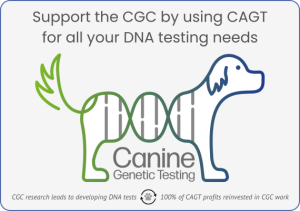
Everyone wants the puppy that they buy to live a long and healthy life. And scrupulous, health-conscious dog breeders feel the same way; the last thing they want is to breed puppies that will become sick. One way that breeders can maximise the chances that the puppies they breed will be healthy is to health-test potential parents, prior to breeding. Health tests take the form of clinical tests, such as hip scoring or an eye examination, and genetic tests, where the DNA of the dog is analysed.
There is a wide range of health tests available, only some of which are relevant to each individual breed, and understanding which tests should be used for each breed is complicated, as new genetic tests become available fairly frequently.
During 2025 the Kennel Club published the Health Standard, which promises to simplify the process of deciding which health tests to use, and make it easier, particularly for novice breeders, to test potential sires and dams for the inherited diseases that are most relevant to their breed.
For every Kennel Club-registered breed the Health Standard lists Good Practice tests, which are the most critical tests, and should be undertaken as a bare minimum, and Best Practice tests, which are for conditions which are still important to a breed but may not be as critical as those listed as good practice. They may be less common or newly discovered, and evidence is still being gathered regarding how important they are.
 Canine Genetic Testing (CAGT), which is the canine genetic testing service offered by the Canine Genetics Centre (CGC), offers over 90 different genetic tests that are relevant to a large number of different breeds. CAGT works hard to try to make genetic testing as cost effective as possible for breeders, and offers breed-specific bundles wherever possible, to help simplify the process of genetic testing potential breeding dogs. All the profits that CAGT makes are used by the CGC to fund research into inherited diseases in dogs, so by using CAGT, dog breeders can rest assured that they are playing a key role in securing the health of future generations of dogs.
Canine Genetic Testing (CAGT), which is the canine genetic testing service offered by the Canine Genetics Centre (CGC), offers over 90 different genetic tests that are relevant to a large number of different breeds. CAGT works hard to try to make genetic testing as cost effective as possible for breeders, and offers breed-specific bundles wherever possible, to help simplify the process of genetic testing potential breeding dogs. All the profits that CAGT makes are used by the CGC to fund research into inherited diseases in dogs, so by using CAGT, dog breeders can rest assured that they are playing a key role in securing the health of future generations of dogs.
Currently there are 14 different breeds that have more than one genetic test listed on the Kennel Club’s Health Standard as good or best practice, and for which CAGT offers every test as part of a single, cost-effective bundle. The breeds that can purchase all their good and best practice DNA tests in a single, affordable order are the Australian Shepherd, Cavalier King Charles Spaniel, Chinese Crested, Cocker Spaniel, English Springer Spaniel, Golden Retriever, Irish Setter, Jack Russell Terrier, Lancashire Heeler, Leonberger, Parson Russell Terrier, Standard Poodle, Staffordshire Bull Terrier and Tibetan Terrier.
For most of these breeds, at least one of their Good and/or Best practice tests were originally developed by the CGC, as a result of research undertaken, in some cases, over many years. So by choosing to use CAGT for their genetic testing needs, breeders of these 14 breeds are acknowledging the CGC for their contribution to their breed’s future health, as well as helping to ensure that the CGC remains able to keep doing what it does best – investigate inherited diseases in dogs and develop tools to keep future generations of dogs happy and healthy.

